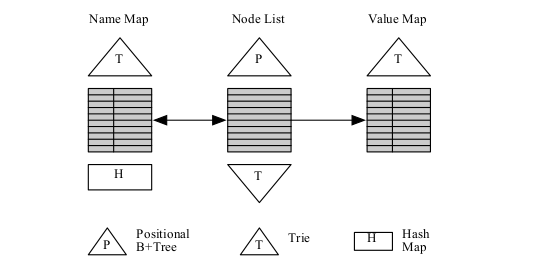
Abstract
<p>Two competing encoding concepts are known to scale well with growing amounts of XML data: XPath Accelerator encoding implemented by MonetDB for in-memory documents and X-Hive’s Persistent DOM for on-disk storage. We identified two ways to improve XPath Accelerator and present prototypes for the respective techniques: BaseX boosts inmemory performance with optimized data and value index structures while Idefix introduces native block-oriented persistence with logarithmic update behavior for true scalability, overcoming main-memory constraints.</p><p>An easy-to-use Java-based benchmarking framework was developed and used to consistently compare these competing techniques and perform scalability measurements. The established XMark benchmark was applied to all four systems under test. Additional fulltext-sensitive queries against the well-known DBLP database complement the XMark results. Not only did the latest version of X-Hive finally surprise with good scalability and performance numbers. Also, both BaseX and Idefix hold their promise to push XPath Accelerator to its limits: BaseX efficiently exploits available main memory to speedup XML queries while Idefix surpasses main-memory constraints and rivals the on-disk leadership of X-Hive. The competition between XPath Accelerator and Persistent DOM definitely is relaunched.</p>
BibTeX (Download)
@inproceedings{Gruen2006Pushing,
title = {Pushing XPath Accelerator to its Limits},
author = {Christian Grün and Alexander Holupirek and Marc Kramis and Marc H. Scholl and Marcel Waldvogel},
url = {https://netfuture.ch/wp-content/uploads/2006/gruen06pushing.pdf},
year = {2006},
date = {2006-06-01},
urldate = {1000-01-01},
booktitle = {Proceedings of the First International Workshop on Performance and Evaluation of Data Management Systems (EXPDB 2006)},
publisher = {ACM},
abstract = {<p>Two competing encoding concepts are known to scale well with growing amounts of XML data: XPath Accelerator encoding implemented by MonetDB for in-memory documents and X-Hive's Persistent DOM for on-disk storage. We identified two ways to improve XPath Accelerator and present prototypes for the respective techniques: BaseX boosts inmemory performance with optimized data and value index structures while Idefix introduces native block-oriented persistence with logarithmic update behavior for true scalability, overcoming main-memory constraints.</p><p>An easy-to-use Java-based benchmarking framework was developed and used to consistently compare these competing techniques and perform scalability measurements. The established XMark benchmark was applied to all four systems under test. Additional fulltext-sensitive queries against the well-known DBLP database complement the XMark results. Not only did the latest version of X-Hive finally surprise with good scalability and performance numbers. Also, both BaseX and Idefix hold their promise to push XPath Accelerator to its limits: BaseX efficiently exploits available main memory to speedup XML queries while Idefix surpasses main-memory constraints and rivals the on-disk leadership of X-Hive. The competition between XPath Accelerator and Persistent DOM definitely is relaunched.</p>},
keywords = {XML},
pubstate = {published},
tppubtype = {inproceedings}
}



